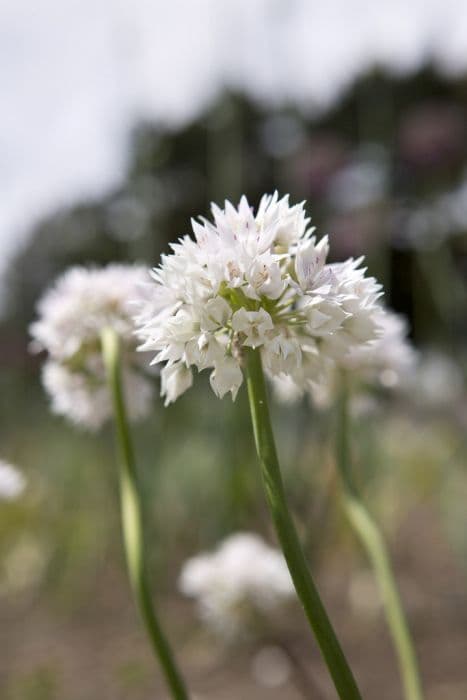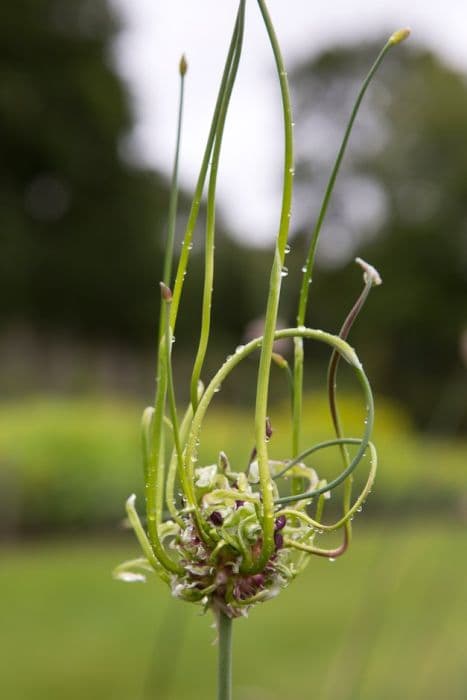Ornamental onion Allium 'Pinball Wizard'

ABOUT
Allium 'Pinball Wizard' is a striking ornamental plant known for its alluring spherical blooms. The flowers themselves are composed of a multitude of smaller, star-shaped blossoms that create a dense, globe-like cluster. These enchanting spheres perch atop sturdy, upright stems, which emerge from a base of strappy, linear, and green foliage. The leaves are typically lush and create a good contrast with the impressive flower heads. The blossoms of 'Pinball Wizard' boast a captivating shade that usually falls within a palette of purple, pink, or lilac, exuding a vibrant and bold appearance that can add spectacular visual interest to any garden setting. Each individual floret adds to the intricate texture of the overall flower ball, which looks exceptionally ornate when observed up close. This display of color and form is particularly eye-catching in the late spring to early summer when the plant reaches its peak blooming phase, offering a showy spectacle that can draw the attention of onlookers and pollinators alike.
About this plant
 Names
NamesFamily
Amaryllidaceae
Synonyms
Pinball Wizard Allium, Ornamental Onion
Common names
Allium 'Pinball Wizard'
 Toxicity
ToxicityTo humans
The Allium 'Pinball Wizard' is a cultivar of ornamental onion. Ornamental onions, in general, are not considered highly toxic to humans; however, they can cause discomfort if ingested in large quantities. Symptoms of ingestion may include gastrointestinal irritation, nauseousness, vomiting, and diarrhea. It is essential to be cautious and avoid consuming large amounts of this plant.
To pets
The Allium 'Pinball Wizard' is a member of the Allium family, which includes onions and garlic, and is toxic to pets, particularly dogs and cats. If a pet ingests this plant, they may exhibit symptoms of toxicity, which include gastrointestinal issues like vomiting and diarrhea, as well as more severe conditions such as lethargy, abdominal pain, elevated heart and respiratory rates, weakness, and even collapse. Ingestion of the Allium 'Pinball Wizard' can lead to hemolytic anemia due to the damage to the red blood cells, which can be dangerous and potentially life-threatening. It is important to prevent pets from accessing these plants and seek veterinary care immediately if ingestion is suspected.
 Characteristics
CharacteristicsLife cycle
Perennials
Foliage type
Deciduous
Color of leaves
Green
Flower color
Purple
Height
2-3 feet (60-90 cm)
Spread
1-2 feet (30-60 cm)
Plant type
Bulb
Hardiness zones
5
Native area
None specified
Benefits
 General Benefits
General Benefits- Ornamental Appeal: 'Pinball Wizard' has large, spherical flower heads that can add visual interest to a garden.
- Drought Tolerance: Once established, it can tolerate drought, making it suitable for water-wise gardens.
- Low Maintenance: Requires minimal care once established, not needing frequent watering or fertilizing.
- Pest Resistant: Tends to be resistant to many common garden pests, reducing the need for pesticides.
- Attracts Pollinators: The flowers attract bees, butterflies, and other pollinators, supporting biodiversity.
- Long Blooming Period: Offers a lengthy display of flowers, often lasting several weeks.
- Versatility: Can be used in a variety of garden settings, including borders, rock gardens, and as cut flowers.
- Deer Resistant: Typically not favored by deer, which can help prevent damage to the plant and garden.
- Seasonal Interest: Adds interest to the garden in different seasons with its foliage and flower structure.
 Medical Properties
Medical PropertiesThis plant is not used for medical purposes.
 Air-purifying Qualities
Air-purifying QualitiesThis plant is not specifically known for air purifying qualities.
 Other Uses
Other Uses- The tall stems and globular blooms of Allium 'Pinball Wizard' can be dried and used in floral arrangements to add height and interest to the composition.
- The sturdy dried seed heads can be spray-painted and used as unique additions to craft projects or as decorative elements in garden art installations.
- Allium 'Pinball Wizard' can be used as a natural fencing material when planted in dense rows, providing both privacy and an attractive visual barrier.
- The cut flowers can serve as an eco-friendly alternative to traditional confetti at weddings or celebrations, with the petals being biodegradable.
- The plant can be incorporated into companion planting strategies to deter common pests from more sensitive garden plants due to its characteristic onion scent.
- Allium 'Pinball Wizard' can be planted in outdoor containers to create mobile garden displays that can be rearranged as desired.
- The fibrous stems and roots may be used in a school science project to demonstrate the plant's ability to uptake and store nutrients.
- Photographers may use the striking flowers as a natural backdrop or an engaging prop for portrait and macro photography sessions.
- Gardeners may use the spent Allium 'Pinball Wizard' plants as mulch for garden beds, contributing to soil health as it decomposes.
- The distinctive shape and silhouette of Allium 'Pinball Wizard' can inspire artists and designers, being used as a motif in fabric designs, wallpaper patterns, or in other decorative arts.
Interesting Facts
 Feng Shui
Feng ShuiThe plant Allium 'Pinball Wizard', commonly known as ornamental onion, is not used in Feng Shui practice.
 Zodiac Sign Compitability
Zodiac Sign CompitabilityThe plant Allium 'Pinball Wizard', commonly known as ornamental onion, is not used in astrology practice.
 Plant Symbolism
Plant Symbolism- Unity: As a member of the onion family, alliums, such as 'Pinball Wizard', often represent unity due to their layers which can symbolize bringing together many parts to make a whole.
- Patience: 'Pinball Wizard', like other alliums, takes time to grow and bloom, symbolizing patience as a virtue needed to see something beautiful come to fruition.
- Good Fortune: Alliums are sometimes seen as symbols of good luck and prosperity due to their spherical shape, which is reminiscent of coins and hence wealth.
- Strength and Courage: The robust stems and hardiness of 'Pinball Wizard' allium represent resilience and the courage to stand tall through adversity.
- Humility: Despite its impressive bloom, once an allium's flowers fade, the plant humbly recedes, symbolizing the trait of humility in its cycle of showiness and modesty.
 Water
WaterOrnamental onions should be watered thoroughly once a week, providing enough moisture to soak the soil to the root level. During hot or dry periods, increase watering to twice per week, ensuring each time that the water penetrates deeply and doesn't just wet the surface. It's crucial to avoid overwatering, as this can lead to bulb rot. Generally, aim for about an inch of water each week, which equates to around 0.6 gallons per square foot over seven days. Make sure the soil has good drainage to prevent waterlogging.
 Light
LightOrnamental onions thrive in full sunlight, which means they require at least 6 hours of direct sunlight each day. The best spot for these plants is a location that gets unfiltered sun throughout the day. Filtered light or partial shade can reduce the vigor and bloom of the Allium 'Pinball Wizard', so always opt for the sunniest spot in your garden.
 Temperature
TemperatureOrnamental onions prefer temperate climates and can survive in temperatures ranging from about 20°F to 90°F. The ideal temperature for the 'Pinball Wizard' to flourish is between 55°F and 75°F. Avoid planting in areas where temperatures drop below 20°F for prolonged periods, as extreme cold can damage or kill the plant.
 Pruning
PruningPruning ornamental onions is not typically necessary for health but helps maintain their appearance by removing spent blooms. Deadheading after flowers have faded prevents the plant from expending energy on seed production. Cut the stalks down to the base in late fall after the foliage has died back. This annual tidy-up before winter helps prime the plant for a vigorous growth in spring.
 Cleaning
CleaningAs needed
 Soil
SoilThe ideal soil mix for Allium 'Pinball Wizard', commonly known as ornamental onion, should be well-draining with a loamy texture, enriched with organic matter. A neutral to slightly acidic pH between 6.0 and 7.0 is preferred for optimal growth. To make the soil mix, blend garden compost with perlite and peat moss in equal parts for aeration and moisture retention.
 Repotting
RepottingOrnamental onions such as Allium 'Pinball Wizard' are typically grown from bulbs and do not require frequent repotting. Repot the plant every 3-4 years or when it's visibly outgrown its pot or the soil has depleted, preferably in the autumn after the foliage has died back.
 Humidity & Misting
Humidity & MistingOrnamental onions like Allium 'Pinball Wizard' are not particularly humidity-sensitive and can thrive in average outdoor humidity levels. They do well in the humidity range typical of temperate climates, without the need for additional humidity adjustments.
 Suitable locations
Suitable locationsIndoor
Ensure full sun, good ventilation, and well-draining soil.
Outdoor
Plant in full sun, well-draining soil, and space bulbs 20 cm apart.
Hardiness zone
5-8 USDA
 Life cycle
Life cycleAllium 'Pinball Wizard', commonly known as ornamental onion, begins its life as a bulb planted in the fall, where it undergoes a period of dormancy during the colder months. As temperatures rise in spring, shoots emerge from the soil, developing into tall stems with strap-shaped leaves. By late spring to early summer, the plant produces large, spherical, and attractive flower heads consisting of numerous star-shaped florets that can attract pollinators such as bees and butterflies. After flowering, the blooms may fade, and the plant enters a phase of seed development if the flowers have been pollinated. Once the seeds mature, the foliage yellows and dies back, and the plant goes into dormancy, conserving energy within the bulb. The cycle is repeated annually, with the bulb producing new growth each spring.
 Propogation
PropogationPropogation time
Early spring
The Allium 'Pinball Wizard', commonly known as ornamental onion, is generally propagated by dividing its bulbs. The best time to propagate 'Pinball Wizard' is during its dormancy period, usually in late summer to early fall. To propagate by division, gently lift the clump of bulbs with a spade, ensuring minimal damage. Separate the bulbs by hand, carefully untangling the roots. Each bulb can then be replanted immediately at a depth of about three times the height of the bulb, which often translates to 6 to 8 inches (15-20cm) deep, ensuring adequate space for the roots to spread. Good soil drainage is essential for the healthy growth of new plants. Water the newly planted bulbs moderately to help establish them.








